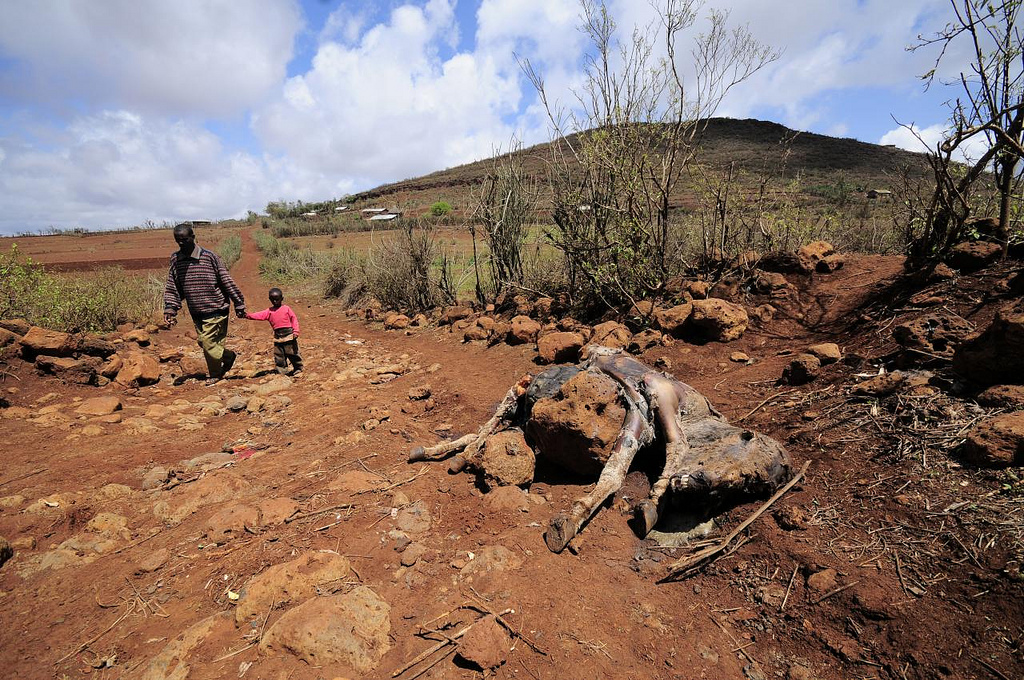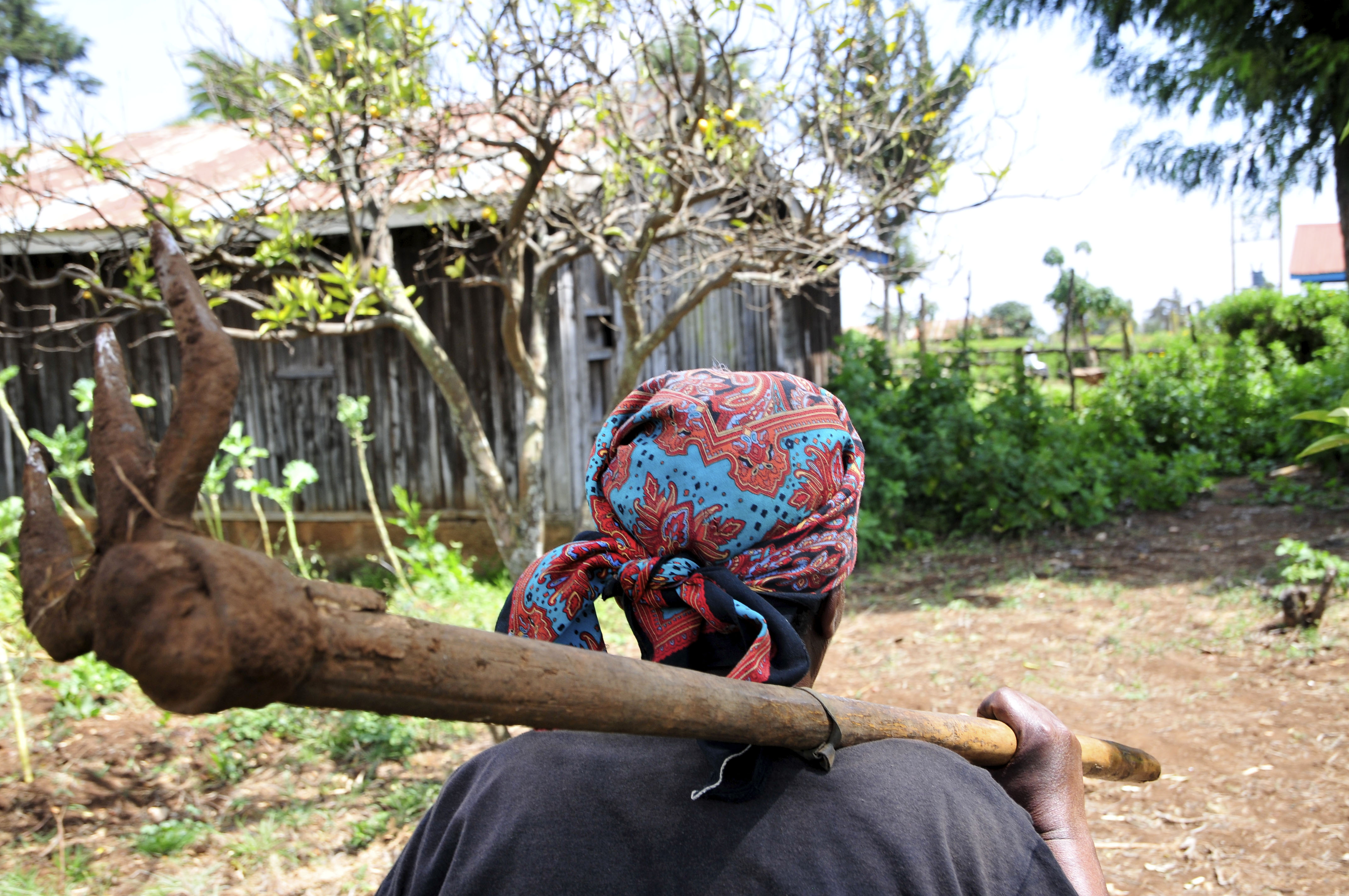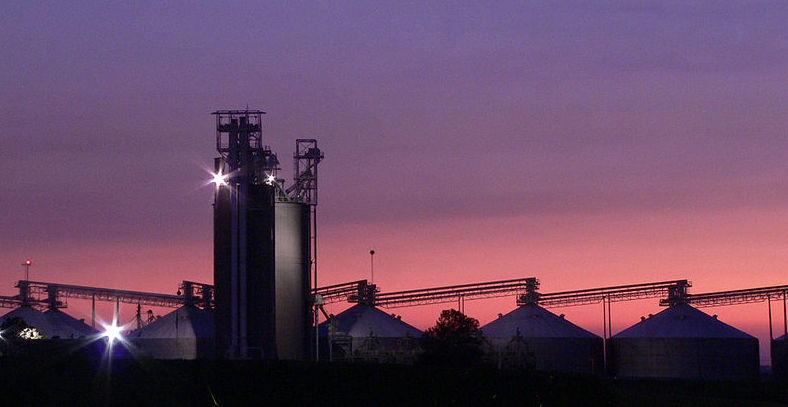Current policies often favor large farms at the expense of small growers who produce most of the world’s food, writes Jomo Kwame Sundaram.
By Jomo Kwame Sundaram
in Kuala Lumpur
Inter Press Service
 For two centuries, all too many discussions about hunger and resource scarcity has been haunted by the ghost of Parson Thomas Malthus.
For two centuries, all too many discussions about hunger and resource scarcity has been haunted by the ghost of Parson Thomas Malthus.
Malthus warned that rising populations would exhaust resources, especially those needed for food production. Exponential population growth would outstrip food output.
Humanity now faces a major challenge as global warming is expected to frustrate the production of enough food as the world population rises to 9.7 billion by 2050. Timothy Wise’s new book “Eating Tomorrow: Agribusiness, Family Farmers, and the Battle for the Future of Food,” argues that most solutions currently put forward by government, philanthropic and private sector luminaries are misleading.

Livestock carcass in 2010 in Marsabit, in Northern Kenya, amid long drought. (Neil Palmer with CIAT via Flickr)
Malthus’ Ghost Returns
The early 2008 food price crisis has often been wrongly associated with the 2008-2009 global financial crisis. The number of hungry in the world was said to have risen to over a billion, feeding a resurgence of neo-Malthusianism.
Agribusiness advocates fed such fears, insisting that food production must double by 2050, and high-yielding industrial agriculture, under the auspices of agribusiness, is the only solution. In fact, the world is mainly fed by hundreds of millions of small-scale, often called family farmers who produce over two-thirds of developing countries’ food.
Contrary to conventional wisdom, neither food scarcity nor poor physical access are the main causes of food insecurity and hunger. Instead, Reuters has observed a “global grain glut,” with surplus cereal stocks piling up.
Meanwhile, poor production, processing and storage facilities cause food losses of an average of about a third of developing countries’ output. A similar share is believed lost in rich countries due to wasteful food storage, marketing and consumption behavior.
Nevertheless, despite grain abundance, the 2018 “State of Food Security and Nutrition” report — by the Rome-based United Nations food agencies led by the Food and Agriculture Organization (FAO) — reported rising chronic and severe hunger or undernourishment involving more than 800 million.
Political, philanthropic and corporate leaders have promised to help struggling African and other countries grow more food, by offering to improve farming practices. New seed and other technologies would modernize those left behind.
But producing more food, by itself, does not enable the hungry to eat. Thus, agribusiness and its philanthropic promoters are often the problem, not the solution, in feeding the world.
“Eating Tomorrow” addresses related questions such as: Why doesn’t rising global food production feed the hungry? How can we “feed the world” amid rising populations and unsustainable pressure on land, water and other natural resources that farmers need to grow food?
Family Farmers Lack Power
Drawing on five years of extensive fieldwork in Southern Africa, Mexico, India and the U.S. Midwest, Wise concludes that the problem is essentially one of power. He shows how powerful business interests influence government food and agricultural policies to favor large farms.
This is typically at the expense of “family” farmers, who grow most of the world’s food, but also puts consumers and others at risk, e.g., due to agrochemical use. His many examples not only detail and explain the many problems small-scale farmers, but also their typically constructive responses despite lack of support, if not worse, from most governments:
- In Mexico, trade liberalization following the 1993 North American Free Trade Area (NAFTA) agreement swamped the country with cheap, subsidized U.S. maize and pork, accelerating migration from the countryside. Apparently, this was actively encouraged by transnational pork producers employing “undocumented” and non-unionized Mexican workers willing to accept low wages and poor working conditions.
- In Malawi, large government subsidies encouraged farmers to buy commercial fertilizers and seeds from U.S. agribusinesses such as now Bayer-owned Monsanto, but to little effect, as their productivity and food security stagnated or even deteriorated. Meanwhile, Monsanto took over the government seed company, favoring its own patented seeds at the expense of productive local varieties. A former senior Monsanto official co-authored the national seed policy that threatens to criminalize farmers who save, exchange and sell seeds instead.
- In Zambia, greater use of seeds and fertilizers from agribusiness tripled maize production without reducing the country’s very high rates of poverty and malnutrition. Meanwhile, as the government provides 250,000-acre “farm blocks” to foreign investors, family farmers struggle for title to farm land.
- In Mozambique too, the government gives away vast tracts of farm land to foreign investors. Meanwhile, women-led cooperatives successfully run their own native maize seed banks.
- Iowa promotes vast monocultures of maize and soybean to feed hogs and produce bioethanol rather than “feed the world.”
- A large Mexican farmer cooperative launched an “agro-ecological revolution,” while the old government kept trying to legalize Monsanto’s controversial genetically modified maize. Farmers have thus far halted the Monsanto plan, arguing that GM corn threatens the rich diversity of native Mexican varieties.
Much of the research for the book was done in 2014-15, when Barack Obama was U.S. president, although the narrative begins with developments and policies following the 2008 food price crisis, during the last year of former President George W. Bush. The book tells a story of U.S. big business’ influence on policies enabling more aggressive transnational expansion.
Yet, Wise remains optimistic, emphasizing that the world can feed the hungry, many of whom are family farmers. Despite the challenges they face, many family farmers are finding innovative and effective ways to grow more and better food. He advocates support for farmers’ efforts to improve their soil, output and wellbeing.
Eating Better
Hungry farmers are nourishing their life-giving soils using more ecologically sound practices to plant a diversity of native crops, instead of using costly chemicals for export-oriented monocultures. According to Wise, they are growing more and better food, and are capable of feeding the hungry.
Unfortunately, most national governments and international institutions still favor large-scale, high-input, industrial agriculture. This neglects more sustainable solutions offered by family farmers, and the need to improve the wellbeing of poor farmers.
Undoubtedly, many new agricultural techniques offer the prospect of improving the welfare of farmers, not only by increasing productivity and output, but also by limiting costs, using scarce resources more effectively, and reducing the drudgery of farm work.
But the world must recognize that farming may no longer be viable for many who face land, water and other resource constraints, unless they get better access to such resources. Meanwhile, malnutrition of various types affects well over 2 billion people in the world, and industrial agriculture contributes about 30 percent of greenhouse gas emissions.
Going forward, it will be important to ensure affordable, healthy and nutritious food supplies for all, mindful not only of food and water safety, but also of various pollution threats. A related challenge will be to enhance dietary diversity affordably to overcome micronutrient deficiencies and diet-related non-communicable diseases for all.
Jomo Kwame Sundaram, a former economics professor, was United Nations assistant secretary-general for economic development, and received the Wassily Leontief Prize for Advancing the Frontiers of Economic Thought.



“As a farm boy a long time ago I have always had a different perspective about agriculture. When I walk into a supermarket, I am still amazed at the quantities of good, cheap food offered in them.”
It depends what you want to buy. The prices of fruit and vegetables in USA are comparatively very high, whole grain products — it is a mixed picture, meat, slice bread, cookies, over-sugared cereals etc. are plentiful and cheap. Mass production is most efficient for unhealthy nutrition.
It seems that the author fell prey for the propaganda of the big corporations that claim they are agribusiness. But first of all we need to understand better what is agribusiness, in the developed world there are thousands of small/medium firms that are big enough to pay for the machinery, for people training and keeping up with the latest techniques, but they are neither powerful corporations nor small growers. Keep in mind that there are huge variations within agribusiness itself and accusing all the government policies that are now in place in the developed world as a favour to the big corporations is an oversimplification that does more harm than good.
From the article:
But producing more food, by itself, does not enable the hungry to eat. Thus, agribusiness and its philanthropic promoters are often the problem, not the solution, in feeding the world.
“Eating Tomorrow” addresses related questions such as: Why doesn’t rising global food production feed the hungry? How can we “feed the world” amid rising populations and unsustainable pressure on land, water and other natural resources that farmers need to grow food?”
As a farm boy a long time ago I have always had a different perspective about agriculture. When I walk into a supermarket, I am still amazed at the quantities of good, cheap food offered in them.
I think in many ways that it because of our weather and available land, where farmers had enough land to employ modern farming methods. So I am continually impressed with the productivity of our farmers who happen to be good people who in the main, feel good about what the are doing. Feeding over 95 percent of the people is impressive and exporting food to boot.
Environmental problems caused by runoff and overuse of fertilizers, correcting them is important and they have been and continue to be addressed. Too many fat people, that is a problem that needs to be addressed. And there are others, of course.
Many of the problems mentioned by the article and by the commenters are real, and need to be addressed. But that is not the so called big farmer’s problem and I think you will find that they love the land more than most and are willing to accept change. They do it every day.
And take a walk through the super markets and try to remember why food is so cheap. Remember to walk past the aisles that make you fat, and remember the health problems are seldom caused by what the farmer’s produce.
Call me a skeptic, but when I see grass feed beef and organic eggs, and look at the prices, I pass them by.
More and more people are waking up everyday!
Sep 23, 2016 Bayer And Monsanto Merge
The Two Worst Companies You Buy From Everyday
https://youtu.be/I6CQUQ5hAJ8
Dec 19, 2015 The Complete History of Monsanto: Over 100 Years of Poisoning Planet Earth
Of all the mega-corps running amok, Monsanto has consistently outperformed its rivals, earning the crown as “most evil corporation on Earth.
https://youtu.be/AKsVOmEh2iw
Amen. And a spectacular achievement, given the the height of the bar.
This is a great article bringing awareness to important issues, but it does not contain a real solution.
I believe the only practical solution is to ensure each family a hectare of free untaxed land for lifetime use and the right to pass on the plot through insurance. This small scale family land grant system like the Russian homestead law campaigned for by the grassroots political party Rodnaya partia (family or native party) enacted a couple years ago gives each person an opportunity to become producers instead of consumers.
You ought to look into huglekulture gardening as a form of carbon sequestering, water retention and food production. It is a standard for food production on Russian homestead settlements. Trees used for huglekulture are not just temporary carbon sequestering devices. This is low tech human intervention can actually sequester carbon and heal the planet faster than wild nature or any high tech devices.
It’s time to campaign for land rights.
The practical knowledge that is accumulated by members of a family farm over generations in a single local is extremely valuable. They are the experts there. Not academics, governments, or big ag. When a family farm goes out of business it is a travesty.
We think we have it bad in the USA; the French government has made an art form out of bureaucratic red tape—hence the yellow vests. Even though it is more complicated, I liked it when a few years ago the French populace stood up to proposed excessive EU regulation by saying, “No, we support our farmers…period.” Much of their economy is supported by wine grape production, some of which comes from extremely valuable land. A complex situation; still the French tend to be fanatical about the quality of their food. Not so in the USA. Why are Americans so obese in 2019?
Have you noticed that if you mention “farmers” in a political discussion in the USA, the knee jerk reaction is inevitably: “They get subsidies!” The populace has been properly programmed by propaganda. (wow, a tongue twister).
I actually wrote a book on soil microbiology that I will not stoop to pump here, but from that study I learned. Historically, the 20th century was a time when “science” was elevated up onto a pedestal rivaling even the sky gods.
“Food formulated by industrial scientists” (quote from my 1913 Crisco cookbook).
I prefer mom’s cooking.
Somehow, science, plastics and chemicals were supposed to be the savior and future of mankind. Today, as a baby boomer I am endeavoring to detox my body from all of that.
But the attitudes prevail, promoted by universities—funded by big ag: Soil is dead. Nuc it with herbicides, pesticides, and fungicides, then feed the plants with nitrate-based fertilizer. Not to mention the GMO issues.
Good soil is not dead. Bacteria and fungi are not necessarily the enemy. An excellent book on the subject is “Teaming With Microbes” by Jeff Lowenfels.
Genetic diversity in plant selection is essential. Local farmers traditionally make selections. That is how domesticated plants evolve.
The good news is that so far anyway, the gubment has not been able to stop my neighbor from handing a dozen fresh eggs over the fence, nor me passing back a jar of honey from my bees.
We have been on this farm since WWII. We raise grass-fed Scotch Highland cattle. They never get grain. Cattle are not meant to have grain. Our pasture land is divided in order that we may move our herd from one pasture to another in order to prevent over-grazing and destruction of the soil. We do not use chemical fertilizers or weed repellents. Our cattle are happy and have retained their herd instincts. The hens also are able to scratch the ground, eat blades of grass and the eggs which they produce are of a rich color in the yoke. There are also some hives of bees here and our honey is from pollen gathered from these fields and fruit trees.
This is up-state New York, a land heavily forested with hills and mountains. Winters are long and severe, so we must gather in plenty of hay each year: another reason to keep the fields in good condition. My eldest grandson, an IT specialist, has a place on a hill top about three miles to the east. He is tapping the Maple trees just now, hoping for a good run of maple sap to be boiled to syrup. They have a milk cow, a few beef animals and a wonderful way of life for their little girls.
Yes, too much red meat is not good, We know that. Still, grass-fed beef and venison provide a good source of protein. It is important to not “over-do”. I never buy “farm-raised” fish of any kind, especially salmon. If salmon is not “wild-caught” it is not worth having. Raising cattle, swine, sheep or fish in crowded pens or holding units is dangerous and unhealthy.
For all of the people who claim that the only way to go is to become vegan: At what cost? Our nation’s highways are filled with huge “Semis”, belching out carbon monoxide in order to bring things across the country….and much of that almond milk and those avocados, blueberries and strawberries are raised on super-farms as well.
As a people we need to start raising more of our own foods. It isn’t that difficult and it is wonderful to be connected to the land in such a way.
Upstate New York
That sounds gorgeous William. I’d love to see it. I also have one Scottish Highland cow. When I got her she was young and so attractive I named her “Princess Highland”. Therefore, her progeny, mostly Low-line Angus crosses are also royalty: Princess Cassandra, Princess Leia, Princess Victoria, and Princess Eleanor of Aquitaine.
When I end up a steer he’s just “Prince” (he’s destined for the freezer)
A very good report on a complex serious issue, but I need more to be persuaded that agribusiness cannot be controlled:
1. Can agribusiness not be regulated to reduce pollution, displacements, and unstable cash crop economies?
2. Can the small farm subculture not be assisted to better education, health care, and production efficiency?
3. Can agribusiness displacements be controlled to match out-migration from the small farm economy?
4. Can small farm economy out-migration be limited where necessary to match decent urban employment?
Industrial farming is destroying our top soil, and poisoning our food. Organic is the sustainable solution.
The small farmer has been under assault in the country for so long and we can’t resist exporting the stupidity to other nations. Trade policies that make Mexicans buy our corn and hogs and Haitians our chickens (among many other examples) which drive small land holders off their land so big ag can grab the lands chunk by chunk. And of course, we want famers to buy patented seeds and sue them as may be needed to force their discipleship.
We have an obsession with the incredible over production of the mono crops of corn and soybeans. We can’t overlook the link between these patented commodities and the food processing giants who then turn them into everything from gasoline to the ubiquitous empty carbohydrates that ‘feed’ our junk food diets and cause epidemic diabetes and other poor health outcomes.
(Imagine the reduction in big-pharma and all other medical expenses if we were actually healthy!)
The best thing for small farmers and consumers alike is to return much of the more marginal commodity crop lands to pasture and get the ruminants out of the CAFO’s and onto grass while nurturing the best arable lands for the vegetables that can lead us back to simpler ancestrally appropriate diets. Of course, what is NOT needed in that equation are the patented seed giants and the commodity processing giants who will not go quietly in the night. But ponder the simplicity and peaceableness of a whole foods cycle of life.
It is hopeful that actual health of the land, water and its people lies in small solutions in millions of places, but that hope requires an engagement that feeling optimistic just isn’t going to cut-it. As always, it takes walking away from the big solutions that drive our world.
I’m no expert in this field, but there are a two things that I think need to be emphasized.
1. The average distance that food travels before it is consumed is 1,500 miles. This is obviously very wasteful, and the quality of the food suffers tremendously as a result. The produce in most supermarkets has no flavor and little nutritional value compared to what you can grow in your own back yard.
2. A tremendous amount of waste is involved in the meat industry. Acres upon acres are cultivated to feed cows and pigs, not people, and more acreage is poisoned beyond belief by enclosing thousands and thousands of pigs and cows. Take a drive through the panhandle on a hot summer day and try not to gag. Streams and rivers that used to be clean and full of fish are dead zones because of run-off.
The environmental damage done by industrial monocultures and the meat industry is staggering. The only way forward is for people to return to supporting local family farms and cooperatives.
The old adage states “You are what you eat.”.
Yet it goes beyond that simple reductionist statement.
You are not only what you eat, but also what you eat, ate
Food grown in healthier soil is healthier itself.
Natural vitamins, enzymes, antibiotics, flavanoids, and other necessary nutrients are a result of natural synthesis between fungi, biota, and other microorganisms.
This synthesis occurs in the natural decomposition of food stuff, ie composting.
Fritz Haber, the man credited with the creation of the process for man-made Nitrogen synthesis, warned in his Nobel Prize acceptance speech that reliance on Nitrogen, and man-made synthesis, was likely short-sighted.
He encouraged others to further investigate the role of microorganisms in plant health.
Agribusiness is driven by the profit motive.
The disease caused by nutrient-deficient foods are driving more profits in the “healthcare” industry too.
This is no coincidence.
I call this our growing culture of dependence.
Medieval feudalism was stuck in a reliance of dependency too.
Dependence means more wealth & power to those Elite controlling the systems.
Be warned…..
Very relevant article. I am a family farmer in Australia and would add the following – 1/ “Hunger” is, unfortunately, measured in terms of spendable money, not available food. 2/ Farmers are infinitely less likely to go hungry than their city counterparts of equal income. 3/ “Productivity” of corporate farming counts waste as positive production – Transport, sales, distribution, and even waste disposal are all seen as productive GDP.
Certainly some resource appropriation for family farmers would be beneficial, but above all, education, skill retention, and raising the social status of this hugely diverse skill pool, would do more to return some of the real hungry people to personal dignity.
The great urban utopian dream is in decline. Why? Because of debt growth… or…. growth by debt…does that sound better. I’m not going to say it’s a bad idea to have clever ways to feed the urban masses, the bad idea is to form a monopoly…However… that is what wall street has/is giving you, monopolies everywhere and in every sector.
I’m not going to touch on urban decline but I will give you San Francisco…..USA is in the beginning stage of looting…. It’s not to late to sell the condo and buy the farm, your future family generations will thank you.
Bottom line…..Either you control your future….or…..someone else will be in control of your future.
“Every culture that has depended on annual plants for their staple food crops has collapsed.” @RestorationAgD http://bit.ly/1ck0tnM
Well, if any of these folks in Kenya waiting for a sign to start the revolution, here it is…
http://opensociet.org/2019/02/14/black-leopard-confirmed-in-africa-for-first-time-in-100-years